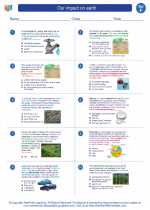Our impact on earth -> taxonomy
Taxonomy
Taxonomy is the science of classifying and naming organisms. It helps scientists organize and understand the diversity of life on Earth. The system of taxonomy was developed by Carolus Linnaeus in the 18th century and has been continuously refined since then. The primary goal of taxonomy is to group organisms based on their similarities and evolutionary relationships.
Levels of Taxonomy
The basic unit of taxonomy is the species, but organisms are classified into a hierarchy of groups based on their shared characteristics. These groups, or taxonomic ranks, include:
- Kingdom: The highest level of classification, which includes all living things. The major kingdoms are Animalia, Plantae, Fungi, Protista, Archaea, and Bacteria.
- Phylum: Each kingdom is divided into phyla, which group organisms based on major body plans and developmental patterns.
- Class: Phyla are further divided into classes, which group organisms with similar characteristics and structures.
- Order: Classes are subdivided into orders, which represent a more specific grouping based on shared characteristics.
- Family: Orders are divided into families, which consist of related genera.
- Genus: Families are further divided into genera, which include closely related species.
- Species: The most specific level, consisting of individuals that are capable of interbreeding and producing fertile offspring.
Classification of Humans
As an example, let's classify humans using the taxonomic ranks:
- Kingdom: Animalia
- Phylum: Chordata
- Class: Mammalia
- Order: Primates
- Family: Hominidae
- Genus: Homo
- Species: Homo sapiens
Importance of Taxonomy
Taxonomy is important for several reasons:
- It helps scientists identify and classify new species.
- It provides a common language for discussing and researching organisms.
- It allows for the study of evolutionary relationships among organisms.
- It aids in conservation efforts by identifying endangered species and their habitats.
- It assists in agriculture, medicine, and other fields by providing information about the characteristics of organisms.
Study Guide
To understand taxonomy, students should focus on the following key concepts:
- Understand the hierarchical levels of taxonomy and the characteristics used to classify organisms at each level.
- Be able to apply the principles of taxonomy to classify familiar organisms, such as plants, animals, and microorganisms.
- Recognize the importance of taxonomy in scientific research, conservation, and other practical applications.
- Be familiar with the history of taxonomy and the contributions of important taxonomists.
By mastering these concepts, students will gain a solid understanding of the principles and applications of taxonomy.
Good luck with your studies!
.◂Science Worksheets and Study Guides Sixth Grade. Our impact on earth

 Worksheet/Answer key
Worksheet/Answer key
 Worksheet/Answer key
Worksheet/Answer key
 Worksheet/Answer key
Worksheet/Answer key
 Vocabulary/Answer key
Vocabulary/Answer key
